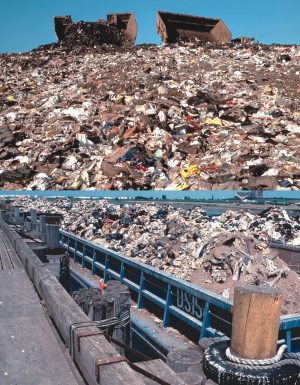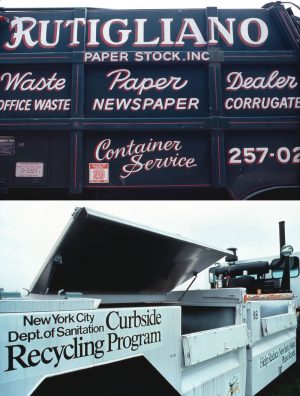
Richard Hertzberg
BioCycle June 2016
The year 2015 is fast fading into past history but it was memorable for some important “revelations” about recycling that are still prominent in 2016. Here are a few of the bigger ones:
• It costs money to run recycling programs. They are not free.
• Demand for recyclable materials goes up and down, including periods when prices can fluctuate dramatically.
• What our parents and grandparents kept telling us is true — don’t put all your eggs in one basket (read “don’t rely on China to be your main buyer”).
• Recyclables are bought and sold across an international marketplace that is largely not subject to influence by American cities and counties, or states for that matter.
• Commingling materials increases customer convenience and collector efficiency but results in more contamination for processors.
Yes, I am being more than a little cynical and sarcastic with this introduction, but it’s frustrating, isn’t it? A little over 45 years beyond the first Earth Day, which inaugurated the modern era of recycling, we have been hearing at numerous conferences, meetings and through media outlets a steady chorus of the themes noted above that amount to a renewed criticism of the very practice of recycling itself.
What is troubling about the current critiques about recycling — even the relatively recent topic of commingling and contamination — is that these industry characteristics are hardly a secret; most have been evident for, well, say 100 years. Ironically the loudest and most visible voice issuing warnings about the practicality and economics of recycling is the company that markets itself as the largest recycler in the world and paints its garbage trucks green — Waste Management — and especially its CEO David Steiner. Mr. Steiner has been joined by spokespersons for other national and regional solid waste service firms in worrying out loud about the profitability of recycling, declining material values, and unfavorable contract terms with municipalities and other government entities.
Notably absent from this decidedly negative and public conversation are representatives from ISRI, the Institute of Scrap Recycling Industries, whose members have been involved with recycling far longer than Waste Management and thus have devised operational and financial strategies for adjusting to prolonged periods of market contraction. Yet it is a confusing picture, for while Waste Management shutters processing plants, Republic Services opens a huge materials recovery facility to serve Las Vegas and metropolitan Clark County, Nevada. And all this downside talk about recycling takes place at the same time garbage collection and disposal revenues, which are by far and away the most significant portion of the major haulers’ bottom line, continue to do quite nicely, thank you.

Modern day recycling got a boost from the closure of Fresh Kills Landfill on Staten Island, NY (above) and an infamous garbage barge that remained at sea after being rejected by 6 states and 3 countries in 1987. Photos by Richard Hertzberg
Bad Decisions
The laments about recycling we are hearing today have everything to do with bad business decisions made in the private and public sectors and misconceptions about recycling, rather than with some alleged inherent flaws about recycling itself — decisions regarding contractual and service arrangements for recycling collection/processing/marketing that ignored historical data, common sense and prudent economics. Cities, counties and haulers entered into contracts whose material revenue projections and sharing clauses were far too optimistic, predicated as they were on an assumed endless Chinese “economic growth miracle.” There is an attractiveness to such arrangements for all concerned because with revenues high, the full costs of delivering recycling services do not have to be carried in the rates charged to customers and recycling can be viewed as “paying for itself.”
Here are some modest suggestions for public sector recycling program administrators and their private sector service providers: Don’t be greedy. Don’t base your contracts on high material prices. Instead, assume your revenue is zero and build the costs of recycling into the rates. Then select one of the many readily available revenue sharing formulas that is mutually agreeable and include it as part of your contract. When sales revenues are good, everybody benefits. When they aren’t then at least the rates cover program operating expenses. But don’t blame recycling because you have forgotten that the word “conservative” is inherently part of conservation.
The True Crisis
Now allow me to focus on what in my view is the true crisis in recycling we face. It has to do with unrealistic expectations and unacknowledged limitations.
The use of recycling as an explicit instrument of public policy to achieve environmental goals related to energy savings, diversion from disposal, and resource depletion traces its history to the multifaceted activism of the late 1960s. It has since been enshrined, codified and implemented through a vast array of legislative, programmatic and infrastructure initiatives that have utterly transformed the solid waste management field.
Yet these initiatives have been carried out within the traditional context of recycling as a commodities business dependent on the expansion of production, consumption, urbanization, industrialization, and “growth” to generate demand for materials. The cyclical dynamics of that business have periodically undermined the economics of recycling, caused doubts about its utility, and constrained its effectiveness in addressing waste generation.
Indeed, in what must be considered a deep paradox, recycling is tied very closely to the conventional ideology that identifies “progress” and a “higher standard of living” with “growth” as measured by the gross domestic product (GDP; also sometimes referred to as gross national product, GNP). This is why, for example, prices for old corrugated containers (OCC, “cardboard”) are viewed as a prime economic indicator. When the production–consumption cycle increases and more goods are manufactured and shipped, the need for OCC rises and so, correspondingly, does the price paid for it. More and more people consuming more and more products is good for recycling. More houses being constructed, more buildings being built, more cars rolling off assembly lines, more soft drinks being drunk, more cereal being eaten for breakfast, more, more, more — it’s all good for recycling. The worst thing for recycling is a recession. Ironically though, a recession is a very strong tool for increasing waste reduction.

Early years of recycling in New York City — commercial recycling truck (1987) and New York City’s multistream recycling collection trailer. Photos by Richard Hertzberg
The contemporary recycling renaissance (post–Earth Day 1970) was energized by a moral revulsion in response to the environmental and cultural consequences of the waste produced by mindless economic growth. Yet it is precisely that growth that feeds recycling. And thus the major role China has played in American recycling and the pitfalls from relying too much on one primary market, which we are now seeing.
Then there are these factors:
• The commingling contamination problem
• Flat recycling rates across the country
• Changes in waste stream composition due to e–commerce and e–communication
Resetting Expectations
It is necessary at this point to state the inescapable: We have expected far too much from recycling and in order to move forward must acknowledge both its contributions and limitations regarding the effort to decrease reliance on disposal as the main waste management method. For those who have spent a considerable portion of their personal and professional lives dedicated to recycling (myself included) this acknowledgement does not come easy. There is an investment worth protecting on many levels. But given the perspective expressed in this piece, it is my conclusion that in the foreseeable future, recycling will not be a major force driving increased diversion in the U.S.
What will be important is organics recovery and transformation through a host of tested and emerging technologies that BioCycle reports on regularly. This is not to understate the operational challenges related to collecting, processing and using a variety of products derived from organics such as mulch, compost and biofuels. But organics have a set of realities that allow for more control over their recovery and markets:
• Organics are a homegrown enterprise, literally, and do not depend on an international commodities marketplace for their financial survival.
• Organics do not require more consumer goods to be produced and purchased to stimulate end use demand, as is the case for recyclables.
• Source separated organics are more homogeneous, do not typically have contamination problems to the extent that commingled recyclables do, and the mechanical procedures and equipment for removing contaminants are well established.
The other contributing source for increased U.S. diversion will come from the continuing clarification and implementation of various policy concepts and initiatives that fall under the broad banner of “sustainability” and are directed to the “upstream” part of the economic cycle (design, manufacture and distribution of products, or “preconsumption”), rather than the “downstream” portion (which is where recycling occurs, or “postconsumption”). They have to do with controlling the composition of the waste stream so it is more uniform, recyclable, compostable and reusable, and with distributing responsibility for waste management throughout the stakeholder spectrum instead of just in the public sector. These concepts and initiatives are expressed in several similar phrases including, among others: product stewardship, enhanced or extended producer responsibility, sustainable materials management, zero waste, circular economy, closed loop economy, and steady state society.
In a nutshell, it is fair to say that recycling has led to a broader, more comprehensive, view of waste management, but cannot take us to the next level.
At this critical juncture a candid recognition of both the contributions and limitations of recycling should not be seen as a negative critique. Instead recycling has provided the basis for moving to the next frontier in the long term battle against wastefulness and for a more sustainable future. And that is no small achievement.
Richard Hertzberg is an environmental consultant and photojournalist based in Lake Oswego, Oregon; rhertzbg@aol.com.










